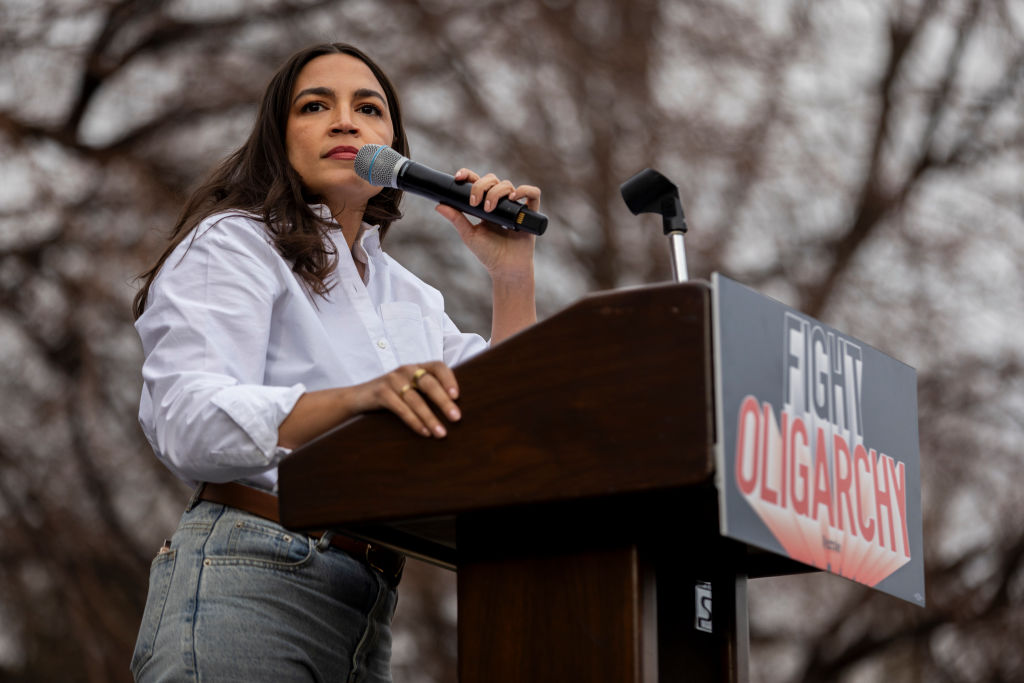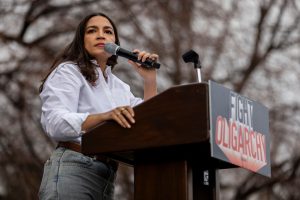
Rep. Alexandria Ocasio-Cortez (D-N.Y.) outraised all of her House colleagues in the first half of 2025. Her campaign raised a whopping $15.4 million and had $9.8 million on hand at the end of June.
Such a major haul could be an indication of ambition for higher office, and Axios reported that Ocasio-Cortez and her team are positioning her to run for president or a Senate seat in 2028.
Ocasio-Cortez fueled donations to her campaign as she toured the nation with Sen. Bernie Sanders (I-Vt.) on their “Fight Oligarchy” tour. The two have energized people dismayed by Democrats’ performance during the 2024 election, and they are leading some of the party’s most energetic pushback to President Donald Trump’s administration.
Senate Minority Leader Chuck Schumer (D), a fellow New Yorker, has come under criticism by members of his own party for not taking a stronger stand against Trump, giving rise to speculation that Ocasio-Cortez may challenge him in 2028.
Who is she?
Ocasio-Cortez became the youngest woman elected to Congress at age 29 after defeating a 10-year incumbent in the 2018 Democratic primary. Currently in her fourth term in Congress, Ocasio-Cortez has become a leader of the Democratic Party’s progressive wing. Easily one of the most high-profile and polarizing figures in her party, Ocasio-Cortez has been outspoken about her progressive priorities, including Medicare for all, free public college tuition and housing as a human right.
In 2019, Ocasio-Cortez introduced her signature legislation, the Green New Deal, with Sen. Ed Markey (D-Mass.). The resolution laid out measures to accomplish ambitious goals across the economy to reach net-zero emissions by 2030. The resolution never passed in the House. In 2024, Ocasio-Cortez and Sanders relaunched the Green New Deal with a new focus on public housing, even as Republicans continue to slam the plan as a “green new scam.”
Over the course of her tenure, Ocasio-Cortez has become more accepted as part of the team, rather than an insurgent. She was selected to serve as vice ranking member of the House Oversight Committee in 2023, but two years later she was defeated for the committee’s top minority position by a more senior lawmaker.
Ocasio-Cortez has championed a number of anti-corruption bills. Working with bipartisan cosponsors, she introduced the Bipartisan Restoring Faith in Government Act this year. The bill would prohibit members of Congress and their families from owning and trading individual stocks. She has since endorsed the Restore Trust in Congress Act, another bipartisan bill to ban stock trading by members of Congress and their families.
“The ability to individually trade stock erodes the public’s trust in government,” Ocasio-Cortez said. “When Members have access to classified information, we should not be trading in the stock market on it. It’s really that simple.”
She also introduced legislation to prohibit Supreme Court justices from accepting gifts over $50 and cosponsored a proposed lifetime ban on former members of Congress from becoming lobbyists.
Follow the money
- In the first quarter of 2025, Ocasio-Cortez raised a record-breaking $9.6 million, more than double her previous-highest quarter and more than any of her colleagues brought in that quarter. Donations spiked after the start of her tour with Sanders began at the end of February. In her second quarter, her campaign received $5.6 million, putting her third in order of most dollars received by candidates that quarter.
- Individual donors contributed on average about $20 to her 2026 campaign. Since her 2020 race, her first as an incumbent, Ocasio-Cortez has consistently ranked in the top three incumbents with the largest proportion of donations coming from small individual donors. At least two thirds of her donations came from small donors in the past three election cycles. Candidates like Ocasio-Cartez who campaign on rejecting corporate political action committees’ and lobbyists’ money often have high shares of individual contributions, as do candidates who are high-profile like Rep. Marjorie Taylor Green (R-Ga.), who ranked first in 2024. That year, only about 27.6 percent of the dollars donated to members of Congress came from individual small donors, compared to 69.9 percent of Ocasio-Cortez’s.
- During the 2024 cycle, only 0.3 percent of the funds her campaign raised came from political action committees. About three quarters of the $40,332 that came from PACs were from labor unions and the rest came from ideological or single-issue organizations. For example, her 2024 campaign received $1,000 from the Sierra Club, an environmental advocacy group that supports clean energy. Ocasio-Cortez joined the House Energy and Commerce Committee in 2025.
- Since her first campaign, Ocasio-Cortez has received no money from corporate PACs. Ocasio-Cortez has consistently rejected contributions from lobbyists as a matter of policy. However, in a small number of instances, contributions from lobbyists who weren’t clearly labeled as such slipped through. In those cases, the campaign has issued refunds once notified.
- The congresswoman owns no individual stocks, according to her 2024 financial disclosure report. She reported between $17,000 to $81,000 in gross assets and $15,001 to $50,000 in student loans.
Why does it matter?
- As the Democratic Party soul searches in advance of the 2028 presidential election, Ocasio-Cortez and Sanders have mobilized tens of thousands at their rallies, driving donations to her campaign committee. Some Democrats and former Sanders aides are speculating that AOC, as she is known, is being positioned to take the torch from the veteran progressive leader. While both lawmakers deny this, Ocasio-Cortez seems to be increasingly positioning herself to run for higher office, with some political observers anticipating her running against Schumer in 2028. Notably, the nearly $10 million the campaign had on hand in June could be transferred to any future federal or state campaign with some restrictions.
- Individual small donors are people who contribute a total of $200 or less in an election. Since her first campaign, Ocasio-Cortez has emphasized the importance of small donors and rejected corporate PAC and lobbyist financing, criticizing their influence on politics. Campaigns often vie for and tout low average donation dollar amounts as evidence of grassroots support from voters.
- Ocasio-Cortez has denounced members of Congress trading individual stocks, including those in her own party, going as far as to refer to their activity as “insider trading.” Lawmakers frequently have access to nonpublic information that influences the market as well as the authority to craft policies for industries they might have financial stakes in. In the 118th Congress, 189 representatives and 54 senators owned stock. According to a 2022 investigation by The New York Times, 97 lawmakers or their family members traded stocks in sectors related to the work of the congressional committees they were on between 2019 to 2021.














